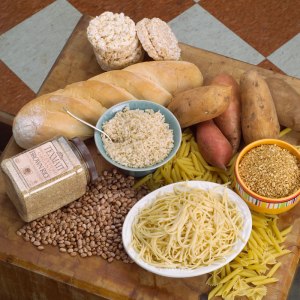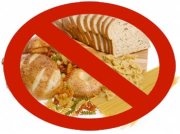 Regular readers will know that I’ve recently looked closely at the impact meat and grain consumption has on my mind and body. Today we’re going to look at how often you should eat.
Regular readers will know that I’ve recently looked closely at the impact meat and grain consumption has on my mind and body. Today we’re going to look at how often you should eat.
We’ll assume that the options are regular small meals, less frequent large meals or somewhere in between. Hopefully no-one is eating frequent large meals.
I received a lot of feedback on my article 5 reasons you’re not getting the fitness results you want, and without doubt the most controversial reason was you’re eating too often.
A good friend of mine who has had incredible results with his training in the past took issue, stating on my Facebook post that he put his success down to eating regular small meals to regulate his protein intake, stop his metabolism from slowing and prevent him from feeling lethargic from heavy meals.
In my initial post I should have clarified that I meant this largely from a weight loss and general health perspective, as most people I speak to and most of my clients are aiming for these goals. If you struggle to gain weight then perhaps ‘eating too infrequently’ might be the root of your inability to pack on muscle.
The reason I picked on ‘eating too often’, rather than ‘eating too much’ was because we’ve been told for years and years, without any decent evidence to support it, that:
- You MUST eat regularly to stop starvation mode and catabolism
- You MUST snack.
- You MUST eat breakfast or come mid-morning you’ll be shoving cake and donuts into any available orifice
Eat more to lose weight, we’ve been told. I’ve actually seen nutritional guides with the words:
You need to eat more to lose weight. Sounds crazy, huh?
Yes, it sounds crazy. And illogical. And wrong. Because that’s what it is. Telling an obese person they need to eat more to lose weight is at best counter-productive, at worst plain dangerous.
Now this is where I really need to clarify my views. I am not necessarily saying that eating regular meals is bad or wrong. My friend got great results with this and so have many others, and it would be extremely arrogant for me to say they shouldn’t have done it this way. My huge issue is with people declaring that this is the way to do it. The best way. The only way.
The recent rise in popularity of Intermittent Fasting, an approach which I’ve been praising for a long time, pretty much proves that skipping meals or even going up to 24 hours without food can be a hugely effective and successful approach. This flies in the face of the ‘eat more to lose weight’ oxymoron.
Many people find that eating lots of small regular meals is impractical, leaves them feeling hungry and miserable and causes them to overeat without realising. Now because they’ve been told they MUST do it this way they get defeatist and down when it doesn’t work out. They then start blaming other factors such as slow metabolisms, genetics or bad karma from a past life. Cue binge eating to feel better about it.
Wouldn’t it be a lot more liberating and positive to simply tick ‘small, regular meals 6 times a day’ off the list, chalk it down to experience and celebrate learning something about yourself? Congratulations, you now know that this didn’t work for your body type or was a bad fit for your personality or schedule. Now you can try a different approach. Of course, if the small meals are working just keep it up and reap the benefits!
So I responded to my regular meal-consuming friend on facebook making the above points and finished with the line:
“My issue is with advice that says you must eat one way, or another. If eating small meals works, then do it. If eating one giant meal in the evening works, then do it”.
This prompted another good friend who works in the fitness industry to tell me that I can’t say eating one meal a day is right, we need to eat in the morning to get our bodies started and that no elite athlete could ever eat one meal a day and to do so would be detrimental to their development.
We discussed it, and I pretty much reiterated my view that you can’t give uniform, blanket approaches to people.
I mentioned the two meal approach that has worked for a huge community of people, and after flicking through the site again I found an incredible example of someone who’s eaten just one meal a day for the last 30 years. Oh, and he also happens to an elite athlete competing at the highest level in one of the most physically demanding sports around, Mixed Martial Arts. He’s 50 and looks about 30 and and is fitter than a cross between Serena Williams and Usain Bolt. Here’s his story:
Would I recommend you eat one meal a day? Probably not, but look at that guy – it would be extremely arrogant for anyone to tell him he’s wrong, or he shouldn’t be doing it his way.
Summary
I don’t want to come across as wishy-washy or indecisive in my approach to nutrition. Experimentation is key, but I want you to know why you’re experimenting and to learn from the journey, not just the end result. Therefore, I want to summarize my meal frequency approach:
If you’re truly eating real, whole foods 80-90% of the time then meal frequency is not important. We’ve established that metabolism isn’t affected by meal frequency so don’t let this myth guide your eating habits. Your very own personalized meal frequency formula should come down to these factors:
- Fitting healthy eating around your social and work schedule
- What meal timing and frequency allows you to control your hunger effectively, and therefore results in you eating the right things in the right amounts when you do eat
- How practical is it for preparation: can you eat 8 quality small meals a day? Personally, I would find that harder to manage than less frequent larger meals
- Simply how you feel when you eat large or small at different times of the day: bloated, fresh; sluggish, at peak performance etc. If you’re energy levels are great and you’re firing on all cylinders then you’re probably doing a lot right. If you’re tired, lethargic and lacking concentration or focus then you’re probably doing a lot wrong
This following point is so important that I’m going to repeat it: as long as you are truly eating the right foods most of the time then a lot of other things fall into place. A lot of people obsessing with when to eat need to first focus on the junk they’re consuming.
What I do
My eating patterns would make your average nutritionist cry. I often skip breakfast, as I recognized that most of the time I eat early it’s because food tastes good, rather than to satisfy my body’s need for energy. Some days I graze throughout the day and don’t eat any proper ‘meals’, other days I’ll go retro and have 3 square meals with no snacks. And occasionally I go 24 hours without consuming any food at all.
But most importantly I focus on eating good quality, real food most of the time. This approach works for me and my current fitness goals.
Diet Controversy
I realise diet and nutrition is as controversial as politics and religion and people get very emotional about it (avoid at dinner parties). However, I hugely welcome debate and opinions both for and against my views. My position on all things fitness, health and nutrition will change and develop, so if you can contribute to that by commenting below or contacting me I’d appreciate it.
If you’ve enjoyed this article, I kindly ask you to ‘like’ our Bangkok Fitness Facebook page, ‘like’ it here and share on social networks if you feel others would benefit. Many thanks!


